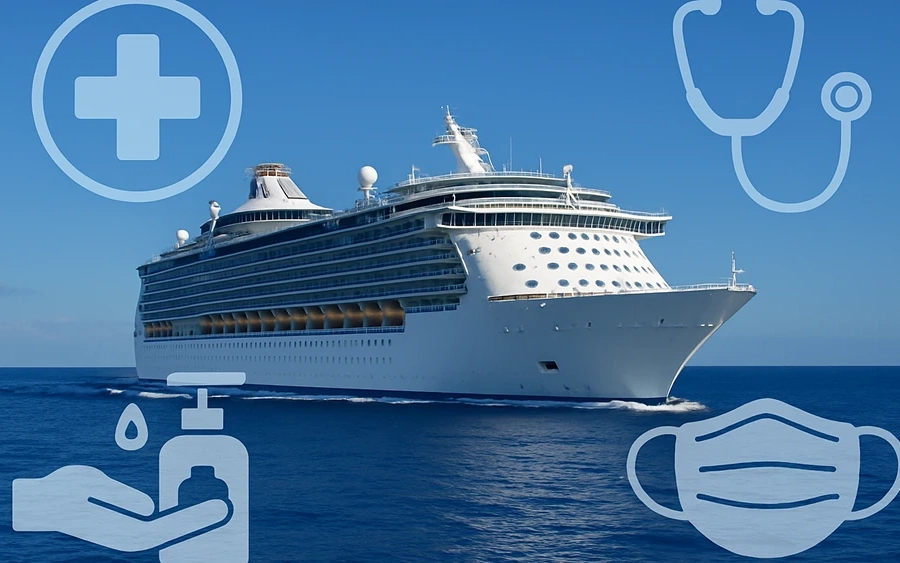Cruises are an incredible way to explore the world. They are a very popular holiday choice for travellers of all ages from families to senior travellers.
Large cruise ships have the capacity to hold thousands of passengers and crew onboard. Like small cities on the sea, they sail for a number of weeks to several months around the globe. Cruise ships have a semi closed environment and with lots of people on board they are the perfect place for infections to spread. Accidents are also a risk, with many stairways, slippery decks and possibility of rough seas, falls are a common cause of injury.
With the right preparation, vaccinations, medications, and onboard precautions you can enjoy your trip while reducing your risk of illness or injury.
In this guide, we’ll cover everything you need to know about cruise travel health, from the most common illnesses on cruise ships to the vaccinations and precautions you should take before and during your journey.
Preparing for a Cruise: Travel Health Checklist
Before your departure, it’s highly recommended to book a consultation with a travel health clinic. A pre-travel health assessment will:
- Review your destinations and itinerary
- Identify required cruise vaccinations
- Discuss health risks from onshore excursions
- Ensure you are fit to travel if you have pre-existing medical conditions
- Plan for the right supply of medications
This step is especially important for higher-risk groups such as older travellers and those living with pre-existing medical conditions such as heart disease, asthma, diabetes and immunosuppression.
Cruise Vaccinations: What You Need Before You Travel
Vaccinations are one of the most effective ways to prevent illness on a cruise. Before travelling, make sure you are up to date with:
- Tetanus Diphtheria Polio
- Measles, mumps, and rubella (MMR)
- Seasonal flu
- COVID-19 (including boosters, if advised)
Depending on your cruise route, additional travel vaccinations such as Yellow fever or malaria prevention may be recommended. Always check your cruise itinerary carefully and consult a travel vaccination clinic well in advance.
Some cruise lines and destinations may have COVID-19 testing or vaccination requirements, so it is important to check the current guidance and confirm these ahead of departure.
It is also wise to check before booking that your chosen cruise line has medical support that can meet your health needs, especially if you have long term health concerns.
Essential Medications to Pack for a Cruise
Being prepared with the right medications is key to staying healthy on a cruise. Always pack:
- Your prescribed medicines in original packaging, with a doctor’s letter if needed
- Extra supplies in case of travel delays
- Motion sickness remedies (consult your doctor or pharmacist for the best option)
- Masks and hand sanitiser for added protection against respiratory infections
- Travel health essential medicines, pain killers, antihistamines, loperamide and rehydration salts. Over the counter travel sickness tablets
- Insect repellent especially if visiting countries with risk of malaria, dengue, chikungunya and zika virus.
Common Illnesses on Cruise Ships
Cruise ships bring together people from across the globe, which makes them hotspots for outbreaks. The most common health risks include:
- Respiratory illnesses such as COVID-19 and influenza
- Gastrointestinal infections such as norovirus and rotavirus
Because passengers and crew share dining rooms, theatres, pools, and cabins, respiratory and gastrointestinal infections can spread quickly.
To reduce your risk of illness onboard:
- Wash your hands regularly with soap and water before eating and after using the toilet.
- Use alcohol-based hand sanitiser when soap is unavailable and carry some alcohol hand gel around the ship and when on land.
- Cover coughs and sneezes with a tissue (not your hands).
- Avoid touching your face unnecessarily.
Manage symptoms and reduce risk of dehydration with rehydration salts and loperamide when required.
Staying safe onboard: Cruise Travel Precautions
Slips, trips and falls are a frequent cause of injury on ships. Embarking/disembarking from large ships to tender boats can prove hazardous as well as slippery decks, stairwells and rough seas. Older travellers may be at increased risk due to poor balance or reduced agility. Over-indulgence in alcohol can also increase the risk of accidents. Passengers should avoid sitting or climbing on balcony or deck railings because of the risk of falling overboard.
While cruise ships usually have medical facilities, these can be limited and expensive. In emergencies, evacuation to a hospital on land may be necessary, but this is not always immediately possible.
It is always important to ensure you travel with:
- Travel insurance relevant for cruise travel. This should include:- medical cover in case of medical assistance on board and on land, personal belongings, baggage, and money cover, cancellation of your trip in an emergency and delayed departure or having to abandon your trip.
- First aid kit including antiseptic, plasters and dressings, pain relief medication.
Final Thoughts: Travel Health for Cruises
Cruises are a fantastic way to see the world, and with the right preparation, you can protect yourself from common health risks. A pre-travel consultation with a travel health expert will help you get the right vaccinations, pack essential medications, and take the right precautions for your cruise.
At MASTA, our 125 nationwide travel health clinics provide expert advice, personalised vaccination plans, and essential travel health support to make sure your cruise holiday is as safe and enjoyable as possible.
Book your travel health consultation today at www.masta.com.





